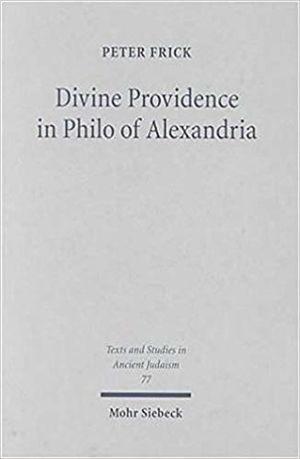Divine Providence in Philo of Alexandria (1999 Frick), book
Divine Providence in Philo of Alexandria (1999) is a book by Peter Frick.
Abstract
"In his study Peter Frick starts with the examination of the theocentric structure of Philo's thought as outlined in the important passage De Opificio Mundi 171-2 where Philo correlates the idea of providence with his concept of God and the theory of creation. On this basis, any adequate understanding of providence in Philo must begin with the correlation between the formal aspects of the Philonic concept of God, especially the idea of God's transcendence, and Philo's conceptualization of the idea of providence in light of these formal aspects. In particular, the issue is how Philo can predicate that God is provident in nature, although God cannot be apprehended in his essence. Moreover, Philo explains the immanence of God in the cosmos in terms of the Logos and the divine powers, one of which he specifically characterizes as the providential power. Both the aspects of divine transcendence and immanence cohere in Philo's theory of creation. He conceives of the role of providence in cosmological matters as being responsible for the design, administration and continuous existence of the created universe. Two further issues, the questions of astral fatalism and theodicy, are critically important for a thorough understanding of Philo's conception of divine providence. Philo rejects the assumption implied in astral fatalism that the stars are transcendent divinities and thus have causal powers over human affairs. And he rejects astral fatalism because it renders absurd the notion of moral responsibility. Concerning the question of theodicy, Philo proceeds from the Platonic premise that God is not the cause for evil in any way. For him, the existence of moral evil exonerates God and his providence as the cause for evil and anchors the blame in the person."--Publisher description.
"Peter Frick untersucht die theozentrische Struktur im Denken Philos, wie es in der bedeutenden Textstelle De Opifcio Mundi 171-2 umrissen wird, in der Philo die Idee der Vorsehung mit seinem Begriff von Gott und der Schöpfungstheorie in Beziehung bringt. Dabei stellt er fest, daß die Aspekte der göttlichen Transzendenz und der Immanenz in Philos Schöpfungstheorie zusammenhängen. Es sind auch zwei weitere Fragen, die des Astralfatalismus und der Theodizee, die für ein umfassendes Verständnis von Philos Begriff der göttlichen Vorsehung wichtig sind. Er weist die im Astralfatalismus implizierten Annahmen als unvereinbar mit dem Begriff der göttlichen Vorsehung zurück und weist auch den Astralfatalismus an sich zurück, da dieser die Vorstellung von moralischer Verantwortung absurd macht. Was Theodizee angeht, geht Philo von der platonischen Annahme aus, daß Gott keineswegs die Ursache des Bösen ist. Die Existenz des moralisch Bösen entlastet Gott und seine Vorsehung als Ursache des Bösen und verankert die Schuld in der Person."--Publisher description.
Editions
Published in Tübingen, Germany: Mohr Siebeck, 1999 (Texts and Studies in Ancient Judaism, 77).
Table of contents
External links
- [ Google Books]
